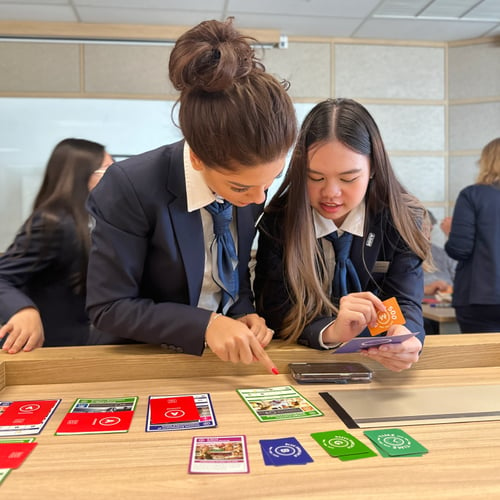Why Should You Study English?

Why English? This is a good question.
First things first. English is not a better language than any other language. It is not more poetic or more practical or even more beautiful than say French or Spanish or even Welsh!
If English isn’t better than other languages, then why has it become the world’s most important language to learn? In some countries, English has become such a central part of schooling that most children graduate high school with the ability to speak, read and write English nearly perfectly—almost as well as their own native language.
These countries realise that mastering English is an essential skill for success in life. Individuals with good English-language abilities enjoy numerous opportunities that non-English-speakers do not. English opens doors to success.

The importance of English as a language of communication, study, and business has several historical, cultural, and practical reasons. At the same time, the dominance of English as a global language is a complex issue with advantages and disadvantages. The reality is that, for better or worse, English has risen to prominence. Gaining a strong command of English is one of the biggest advantages an individual can attain and benefit from today’s world. English has become the world’s lingua franca, the language people from different parts of the world use to communicate with each other.
Indeed, English is now firmly established as the most important language in international business, diplomacy, and academia. It's often used as a common language for global communication, making it a practical choice for international interactions.
Here are some of the key reasons why English has achieved this status:
- The Industrial Revolution
The Industrial Revolution, which began in England, led to significant advancements in technology, trade, and industry. English-speaking nations played a prominent role in this era of global transformation.

- The Rise of the United States as a Superpower
The rise of the United States as an economic and political superpower in the 20th century further promoted the global use of English. Hollywood, the American entertainment industry, and the dominance of American companies in various sectors all contributed to the spread of English. - Pop Culture and Media
English-language movies, music, television shows and literature have had a profound influence on global pop culture. This has led to the widespread adoption of English phrases and expressions. - Technology and the Internet
The Internet has played a significant role in the global prevalence of English. English-language websites, social media platforms and software applications have made English a primary means of online communication.
- International Organisations
Many international organisations, including the United Nations and the European Union, use English as one of their official or working languages. This further cements its status as a lingua franca for diplomacy and international relations.
While English has become the dominant global language of communication, it's important to recognise that there are other significant languages which are also used for international communication, depending on the context. For example, Chinese, Spanish and French are also influential languages in various regions and sectors.
However, and perhaps of greatest significance to us here at AIHM, English is widely used in the tourism industry. People who work in hospitality, travel and related fields often need to communicate with visitors from various parts of the world. This is particularly important in a world that is increasingly interconnected, and so it would not be an understatement to suggest that the ability to communicate in English is something that is vital to our industry.

Why Are So Many People Scared of Learning English?
Perhaps it's not entirely accurate to say that "so many people" are scared of English. However, some individuals may feel apprehensive or anxious about learning or using English for various reasons.
Here are a few common reasons why some people might feel this way:

- Lack of Familiarity
If English is not their native language, some individuals may feel anxious about using it because they are not as familiar with it as their first language. This can make communication challenging, leading to apprehension, or nervousness. - Fear of Making Mistakes
Many people are afraid of making mistakes when speaking or writing in English, which can make them self-conscious about using the language. The fear of embarrassment or being judged by others can be a significant factor. - Cultural Differences
English is often associated with the culture and customs of English-speaking countries, and some individuals may feel intimidated or uncomfortable when trying to navigate this cultural aspect of the language. - Language Anxiety
Language anxiety is a common phenomenon, where individuals feel nervous or anxious when they need to communicate in a language other than their first language. This can be particularly true for formal or high-stakes situations. - Peer Pressure
In some contexts, there may be peer pressure to speak "perfect" English, which can create anxiety for those who do not have a high level of proficiency. - Educational or Professional Pressure
Students and professionals may feel stressed about achieving high scores in English language tests or using English effectively in the workplace, leading to fear and apprehension.
It's important to note that not everyone is scared of English. Many people are enthusiastic about learning and using the language. Language acquisition can be challenging, but with practice, patience and a supportive environment, individuals can become more confident and proficient in English or any other language they are trying to learn.
So, What’s the Answer?
Have fun with it!

I know, I know… it’s easier said than done, but think of English as just a form of communication, nothing more and nothing less. It’s like a game where the players react to each other back and forth.
Think of it like tennis or badminton. All you need to play is a racket and a ball (or a shuttlecock). If one person hits the ball, and then another person hits the ball back, you’re playing tennis!
But to make the game more interesting, we add some rules. You have to hit the ball over a net for instance, and keep it within certain lines marked out on the court. In language terms, that’s all that grammar is, rules to make English more interesting and perhaps even more fun, like tennis!
“Grammar is fun?” I hear you mutter (or scream). Well maybe not all the time. When you’re playing a game, you might not love all the rules at every moment, but in the end, the most important thing is to get the ball back to the other side of the court. The same thing is true with English. The challenge is part of the excitement. When you make a great move or successfully overcome a challenge, you feel a sense of accomplishment and a little—or major—thrill.
Having fun with English can be an enjoyable and rewarding experience.

Here are some creative and enjoyable ways to make learning and using the English language more fun:
- Read for Pleasure
Find books, magazines or online articles that genuinely interest you. Reading for enjoyment can improve your vocabulary and comprehension skills, but the most important word to remember here is enjoyment. - Watch Movies and TV Shows
English-language movies and TV shows can be a great way to improve your listening skills while being entertained. You can even use subtitles to help you understand better. - Play Word Games
Word games like Scrabble, crossword puzzles, and word searches can be both educational and fun. There are also numerous word game apps available for smartphones and tablets.

- Write for Fun
Keep a journal, start a blog, or write short stories or poetry. Expressing yourself through writing can be an enjoyable and creative way to improve your English skills. - Engage in Conversations
Find language exchange partners or conversation clubs in your area or online. Talking with native speakers or fellow learners can be a great way to practice and have fun. - Use Language Learning Apps
There are many language learning apps like Duolingo, Memrise and Babbel that make learning English more interactive and engaging. - Join a Book Club or Discussion Group
Participating in a book club or discussion group can give you the opportunity to discuss literature, current events or other topics in English. Any social club or meet-up group that uses English as its main language of communication is a great place to learn. - Learn through Music
Listen to English songs and try to understand the lyrics. You can even sing along to improve your pronunciation and rhythm. - Watch TED Talks
TED Talks cover a wide range of topics and are usually presented by engaging speakers. They are a great way to learn while being entertained.

- Travel or Virtual Travel
If possible, travel to an English-speaking country and immerse yourself in the language and culture. If you’re not able to do this at the moment, you can virtually explore these places through documentaries, virtual tours and online resources. - Play Interactive Language Games
There are many online games designed to help you learn English in a fun way. For example, you can try games that test your grammar or vocabulary knowledge. Even video games that aren’t “language games” but that include a lot of English language and dialogue can be an exciting way to practice. - Cook with English Recipes
Try cooking using English-language recipes. This is a practical way to learn food-related vocabulary and have a delicious result. - Create Art or Crafts
Engage in creative activities like drawing, painting or crafting while labelling your work in English. Include English in the painting or drawing. Label the objects or incorporate English in creative ways. Watch English-language tutorials. Create English-language labels for the tool and materials you use. Blending English into your artistic activities can be a fun way to improve your vocabulary and practice expressing yourself.

- Attend Workshops or Classes Taught in English
Join workshops on topics that interest you—like photography, cooking or dancing—but in an English-speaking environment. - Learn English Jokes and Puns
Learning jokes and puns in English can be a fun way to improve your understanding of wordplay and humour in the language. - Take a High-Quality English Course
Not all English courses are created equal. The reason some people struggle with English is that they haven’t had the best experience in their past English classes. If you can find a fun course with instructors who use lots of active-learning techniques, you’ll find that you can learn quickly and easily, and the things you learn in class stick with you!

As you can see from the big list of activities above, there are so many ways to make English learning fun! The ways you choose don’t have to be complicated or difficult. Here at AIHM, we even play games like Uno and chess in our English classes. We do jigsaw puzzles and crosswords together. If you’re having a good time while using English, then you’ve found a great way to practice and improve.
Remember that having fun with English is all about enjoying the learning process. Choose activities that genuinely interest you, and you'll find that improving your English skills can be an enjoyable and rewarding experience.
Improve Your English While Having Fun!
The best lessons happen when you’re having fun. AIHM’s 15-week English for Business and Academic Studies (EBAS) course helps you improve your English in an exciting, interactive environment. Explore and expand your English skills in a supportive setting with expert international teachers. You’ve never taken an English course like this before.



